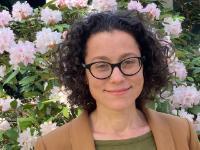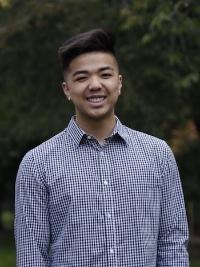CEJS Fellowships
One of the primary goals of CEJS is to support the scholarship of Seattle University students and faculty in Environmental Justice and Sustainability (EJS) endeavors. Each year CEJS awards two faculty fellowships (with a course release or $7,500 stipend) and two student fellowships (with a $2,500 stipend per student project).
/0x35:2400x1566/prod01/channel_34/media/seattle-university/web-redesign-6-25/DuwamishRiver_yck_Water_010.JPG)
Apply Now For A CEJS 2025-26 Fellowship - Deadline: March 3, 2025
CEJS will award two student and two faculty fellowships to do research in AY 2025-2026. Proposals may be submitted by individuals or teams. Projects that include collaboration across disciplines or schools/colleges are particularly encouraged. CEJS research fellows are expected to produce a tangible scholarly product, such as an academic paper, a conference presentation, an artistic exhibit, or other proposed product as a result of their participation in this program.
Student Fellowship Application Materials
Find the fellowship goals, timeline, eligibility, and requirements here:
25-26 CEJS Student Research Fellowship Description
Apply by completing the following form:
25-26 CEJS Student Research Fellowship Application Form
Faculty Fellowship Application Materials
Find the fellowship goals, timeline, eligibility, and requirements here:]
25-26 CEJS Faculty Fellowship Description
Apply by completing the following form:
LAUDATO SI' FACULTY RESEARCH FELLOWSHIPS
The Laudato Si' Faculty Fellowships honor Pope Francis's initiative to promote integral human development by encouraging concrete actions in the care of our common home. The fellowships are offered to faculty members who dedicate their scholarly endeavor to the research of tools, resources and solutions that advance sustainability in the spirit of integral ecology.
-200x200.png) Rob Efird
Rob Efird
Professor, Anthropology and Sociology
CASY 310
efirdr@seattleu.edu
Dr. Efird's research and writing project combines interviews, applied ethnography and archival research to explore the potential for non-Indigenous people to practice environmental education in ways that support decolonization and Indigenous cultural resurgence. This timely intervention comes at a moment when non-Indigenous K-12 educators throughout Washington state are newly obliged by law to teach Indigenous history, culture and sovereignty—but unsure how to do so accurately and respectfully. At the same time, led by a small group of Indigenous and non-Indigenous scholars and practitioners, the international and interdisciplinary field of environmental education (EE) is finally beginning to confront the questions of how to account for settler colonialism in EE research and practice, and how to use that practice as a means of advancing decolonization and Indigenous cultural resurgence. At this critical juncture, there is a pressing need to critically analyze and empirically evaluate these leading-edge developments in EE theory and praxis, and then widely disseminate the conclusions. The results of Dr. Efird's research will be published in 2025 as an invited book chapter in the second edition of Routledge’s Handbook of Environmental Anthropology, and his findings will also form the basis for at least one conference presentation.
John Armstrong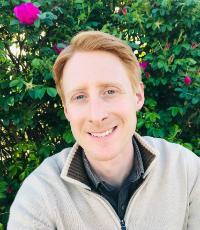
Assistant Professor, Environmental Studies
CASY 210
jarmstrong@seattleu.edu
As the world strives to address the climate crisis, the Intergovernmental Panel on Climate Change and policy experts have long urged that cities must play a major role in mitigating climate change given that urban areas are central sources of greenhouse gas (GHG) emissions. Yet while thousands of cities have taken some form of climate action over the past two decades, only a small number have adopted ambitious policies that will reduce emissions significantly.
Dr. Armstrong's study will examine the development of city climate programs for low-carbon transitions, defined as mandated targets of 80% or greater reduction in GHG emissions by 2050 or sooner, and assess whether and how the policies are integrating environmental justice. In ten cities across the U.S., Armstrong will analyze the political conditions behind the adoption of these low-carbon transition policies. He will adapt and apply the multi-level perspective of the socio-technical transitions framework, which has been used to systematically assess transitions across socio-technical issues but not low-carbon transitions in cities. The study methods include constructing climate policy timelines, analyzing social, political, and economic variables and their changes over time, and interviewing policy officials.
Achieving low-carbon transitions in cities, and doing so in a just manner, is a vitally important sustainability issue. In addition to its scholarly contribution, the study will offer critical guidance for future policy efforts, and he look forward to sharing the findings with city officials, policy networks, and advocates.
Tapoja Chaudhuri 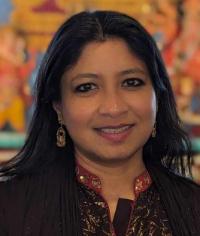
Assistant Teaching Professor
Matteo Ricci Institute
chaudhut@seattleu.edu
Research Fellowship Project: Putting Down Roots - Affective aspects of P-patch gardening in Central Seattle
On September 9, 2023, a group of urban gardeners gathered in Magnuson Park to celebrate the 50th anniversary of the Seattle P-patch city-wide community gardening program. Some, like me, had been gardening in the program for about 5 or more years, but others were there who had been with the program for more than 10 years. Much has been written about the roles that urban community gardens play in enhancing urban sustainability, food security, and community empowerment specifically amongst socio-economically marginalized groups in inner cities. My project on an ethnographic account of the visceral aspects of gardening in the Central District of Seattle plans to add to this literature by exploring the role that ‘affect’ plays in environmental place-making. I define affect as the emotional aspect of any experience with a focus on embodied interactions with both our human and more-than-human neighbors.
I propose to conduct qualitative in-depth analysis of the socio-emotional aspects of urban gardening amongst mostly middle-to-fixed income individuals living in the Central District, for whom gardening/guerilla gardening in and around these p-patches are the only avenues to interact with nature. My project speaks to the question I ask my students: how can our quest to achieve sustainability spark joy? Following Robin Kimmerer, I also ask: what role does visceral engagements with our plant-relatives play in engendering an ethics of sustainability. Lastly, my project engages with the questions of urban environmental governance, especially in the context of increasing tensions between many gardeners and our unhoused neighbors.
Lauren Bibin-200x200.png)
Assistant Professor
College of Nursing
lbibin@seattleu.edu
Fellowship Research Project: Seattle University Sustainability Transformation Assessment in Nursing
The U.S. healthcare industry, paradoxically, significantly contributes to greenhouse gas emissions (GHG) and toxic waste, perpetuating environmental degradation and climate change. This irony highlights that the sector responsible for health preservation is a substantial environmental hazard source, disproportionately impacting marginalized communities with elevated injury, illness, and disease rates. Our project aligns with Pope Francis' Laudato Si' and Seattle University's Reigniting Strategic Directions, notably Goal 1, addressing sustainability and climate change challenges. We aim to demonstrate how organizational introspection and transformation can lead to sustainability. The College of Nursing's Clinical Performance Lab, a simulated healthcare training environment, will conduct a comprehensive sustainability assessment.
This evaluation covers diverse aspects, including operational policies, supply procurement, equipment usage, disposal practices, and infrastructure. We will rely on environmental sustainability evaluation principles endorsed by the American Association of Colleges of Nursing. Additionally, we will integrate insights from the International Nursing Association of Clinical Simulation and Learning (INACSL) and consult a healthcare industry sustainability expert.
Our project will serve as a practical model for implementing sustainability principles in healthcare training spaces and simulating their application in real industry settings. Furthermore, it provides a scholarly foundation for Dr. Lauren Bibin, a first-year Assistant Professor, aligning with Seattle University's mission, the Center for Environmental Justice & Sustainability, and Laudato Si'. Dr. Bibin's active involvement in INACSL's Sustainability SIG and the INACSL Healthcare Standards of Best Practice in Simulation committee enriches our project with insights into simulation center operations' best practices.
Gary L. Chamberlain Fellowship
The Gary Chamberlain Student Research Fellowship honors Dr. Gary Chamberlain who taught at Seattle University from 1979 until 2009 in the Theology and Religious Studies Department. Dr. Chamberlain was a beloved teacher who contributed to the growth of the Environmental Studies Program and encouraged countless students to pursue their passion for environmental advocacy.
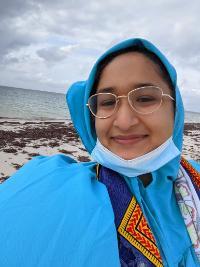
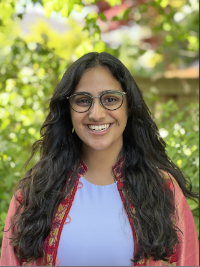 The 2024 - 2025 Gary L. Chamberlain recipients (who will be working together) are Fatema Boxwala and Simren Rai. They are both pursuing a Master of Fine Arts in Arts Leadership, and their research project is entitled “Engrained is Our Story.”According to the Washington State Grain Commission, 2.33 million acres of wheat was harvested in 2021. This mass production of wheat contributes to environmental vulnerabilities such as soil salinity, drought, and wildfires. Chemical intensive wheat-farming practices affect the soil’s nutrients and water.
The 2024 - 2025 Gary L. Chamberlain recipients (who will be working together) are Fatema Boxwala and Simren Rai. They are both pursuing a Master of Fine Arts in Arts Leadership, and their research project is entitled “Engrained is Our Story.”According to the Washington State Grain Commission, 2.33 million acres of wheat was harvested in 2021. This mass production of wheat contributes to environmental vulnerabilities such as soil salinity, drought, and wildfires. Chemical intensive wheat-farming practices affect the soil’s nutrients and water.
We will weave a large installation piece to exhibit around WA state and start conversations about the cultural, environmental and sustainability issues with hybridized wheat production. Engrained is Our Story is a combination fiber arts and storytelling quilt. Each quilt square will be designed based on a narrative around a specific seed - either an indigenous seed that is threatened by mass farming of wheat, or an alternative grain brought to WA state by an immigrant community. Collaborating with stakeholders, we'll create squares reflecting cultural aesthetics and record oral seed memories shared by participating community storytellers. Stakeholders will weave their seeds directly into their square, replicating techniques of protecting seeds when communities are forced to relocate.
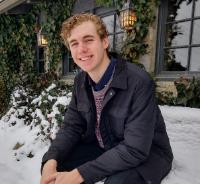
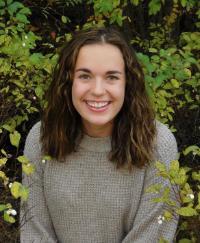 The 2023 - 2024 Gary L. Chamberlain recipients (who will be working together) are Gabe Veltri and Olivia Roberts, both in the College of Science and Engineering. The title of their research is: "Composition of Moss Dwelling Invertebrate Communities in Southern Seattle: Duwamish Valley vs. Seattle Parks."
The 2023 - 2024 Gary L. Chamberlain recipients (who will be working together) are Gabe Veltri and Olivia Roberts, both in the College of Science and Engineering. The title of their research is: "Composition of Moss Dwelling Invertebrate Communities in Southern Seattle: Duwamish Valley vs. Seattle Parks."
Moss is an abundant and critical part of ecosystems worldwide, especially in the temperate ecosystems of the Pacific Northwest. Mosses house a wide array of invertebrates and have been used as a bioindicators of air pollution in the area they grow as they sequester heavy metals. However, comparative studies on the biodiversity of moss-associated invertebrates have been limited. Such research on invertebrates, to our knowledge, has not been done in the Pacific Northwest or Seattle area. Previous studies have examined heavy metal concentrations found in the moss species Orthotrichium lyelli in different Seattle neighborhoods as it is easily distinguishable and abundant. This study uses the same moss subject to sample invertebrate communities from localities in the Duwamish Valley and Seattle green spaces to quantify the biodiversity present in each community. Using this data, we will analyze heavy metal concentrations and percent impervious surfaces, to see if these factors correlate with differences in moss microinvertebrates among sites. This type of research is critical to understand effects of varying biodiversity on ecosystem health, which can be further connected to human health and issues such as classism and racism that are potentially present in various communities.
Watch Gabe and Olivia's CEJS Fellowship Research Introduction Video.
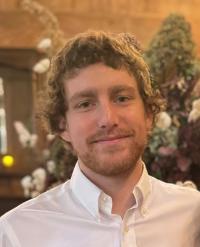 The 2022-2023 Gary L. Chamberlain Fellowship recipient is Peter Durland who attends Seattle University’s School of Law ('23). Peter will examine the current tree retention laws in the city of Seattle and advocate for a change in policy that balances the need for affordable housing with the benefits that tree coverage provides to the city. With housing costs on the rise, many provisions meant for private homeowners such as townhome and detached accessory dwelling unit legislation are being utilized by companies to increase the allowable building footprint and accordingly, profits. This increase in footprint has had a detrimental impact on the canopy coverage in the city, leading to the loss of many benefits provided by Seattle’s urban forest. Additionally, these changes have largely not positively impacted the housing affordability crisis the city currently finds itself in. Peter will analyze these issues in search of a solution that can help to mitigate these complex issues.
The 2022-2023 Gary L. Chamberlain Fellowship recipient is Peter Durland who attends Seattle University’s School of Law ('23). Peter will examine the current tree retention laws in the city of Seattle and advocate for a change in policy that balances the need for affordable housing with the benefits that tree coverage provides to the city. With housing costs on the rise, many provisions meant for private homeowners such as townhome and detached accessory dwelling unit legislation are being utilized by companies to increase the allowable building footprint and accordingly, profits. This increase in footprint has had a detrimental impact on the canopy coverage in the city, leading to the loss of many benefits provided by Seattle’s urban forest. Additionally, these changes have largely not positively impacted the housing affordability crisis the city currently finds itself in. Peter will analyze these issues in search of a solution that can help to mitigate these complex issues.
Watch Peter's CEJS Fellowship Research Introduction video , his mid-term report, final report and watch his final presentation.
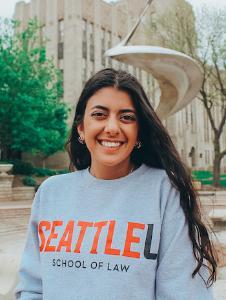
Read Donna's mid-term report, her final report and watch her final presentation.
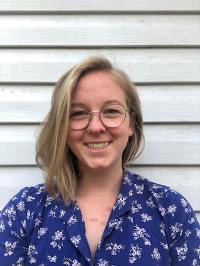 The 2020-2021 Gary L. Chamberlain Fellowship recipient is Piper Klinger ('21) who is majoring in Environmental Science. Piper’s research seeks to develop a comprehensive and inexpensive methodology to prepare biochar adsorbents from wood pellets for use in the treatment of arsenic-contaminated drinking water. This research will develop a protocol for producing biochar from readily available, top-lit, under-draft cookstoves. In addition to producing biochar, these cookstoves are extremely clean-burning which makes their implementation in the developing world critical to the reduction of deaths due to indoor air pollution. The worldwide mortality rate related to indoor air pollution is nearly eight times the rate for deaths related to unsafe drinking water. The proposed work will produce enhanced biochar by modifying the surface of poplar tree pellets with calcium sulfate from discarded wallboard (calcium sulfate). Piper’s faculty mentor will be Dr. Phillip Thompson, CEJS director and professor of civil and environmental engineering.
The 2020-2021 Gary L. Chamberlain Fellowship recipient is Piper Klinger ('21) who is majoring in Environmental Science. Piper’s research seeks to develop a comprehensive and inexpensive methodology to prepare biochar adsorbents from wood pellets for use in the treatment of arsenic-contaminated drinking water. This research will develop a protocol for producing biochar from readily available, top-lit, under-draft cookstoves. In addition to producing biochar, these cookstoves are extremely clean-burning which makes their implementation in the developing world critical to the reduction of deaths due to indoor air pollution. The worldwide mortality rate related to indoor air pollution is nearly eight times the rate for deaths related to unsafe drinking water. The proposed work will produce enhanced biochar by modifying the surface of poplar tree pellets with calcium sulfate from discarded wallboard (calcium sulfate). Piper’s faculty mentor will be Dr. Phillip Thompson, CEJS director and professor of civil and environmental engineering.
Francis Student Research Fellowship
The Francis Student Research Fellowship honors the patron saint of the animals and of ecology, St. Francis of Assisi, and his namesake Pope Francis who, through Laudato Si', encourages us to Care for Our Common Home, to consider the inextricable link between environmental and social sustainability and “to hear both the cry of the earth and the cry of the poor”. We are grateful to Jeanie and Tom Robinson for their generous support of this student research fellowship.
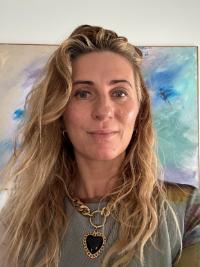
Kamila Kuc is a filmmaker attending the Online Clinical Mental Health Counseling at the College of Education. She will be mentored by Dr. Alex Johnston, Assistant Professor in Film and Digital Media.
Along with the scientific and political dimensions of climate crisis lies a psychological impact that is described by the Portland-based climate therapist and author, Thomas Doherty, as a ‘climate hostage’ situation, whereby people feel anxiously powerless in the face of a global system that heads towards disaster. Although the climate crisis is an intersectional issue, the discourse suffers from narratives of disasters and white saviourism.
By engaging those who have experienced direct and indirect effects of climate change, alongside climate change sceptics, this project aims to address societal and economic injustices that prevail in the discourse of climate change. Fused with the spirit of climate crisis activism and radical art practices, Hyperobjects & Climate Hostages brings together creative arts (film), as well as psycho-social (social dreaming) and mental health practices (counseling), to investigate the development of new ethical frameworks for filmmakers who wish to facilitate safe, collaborative sharing of complex emotions and experiences concerning the climate crisis; the design of new methodologies of care and trust for participatory filmmaking in the context of climate crisis. Kamila is also interested in experimenting with new audio-visual languages that are required to shift representations of climate crisis towards more authentic and affective narratives that are more accessible to wider audiences. This project’s outputs include a series of collaboratively authored short films, a podcast and a scholarly publication about counselling, social dreaming and embodied film practices in the context of climate crisis.
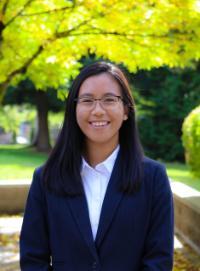 The 2023 - 2024 Francis Student Research Fellowship is Angela Su, who is a part of the College of Nursing. The title of her research is: "Examining Sexual and Reproductive Health Education Strategies and Their Impact on Measures of Social Sustainability."
The 2023 - 2024 Francis Student Research Fellowship is Angela Su, who is a part of the College of Nursing. The title of her research is: "Examining Sexual and Reproductive Health Education Strategies and Their Impact on Measures of Social Sustainability."
Sexual and reproductive health (SRH) education is a pillar of public health education in the United States, and has been used to mobilize SRH knowledge to promote sexual and reproductive well-being. SRH education includes discussions of hormonal changes of puberty, safe-sex practices, pregnancy prevention, and other related topics which allow people to be informed on how to manage changes during their reproductive years. Despite these potential benefits, SRH education has been critiqued for exposing children to sex too early and promoting anti-religious values. These critiques have led to inconsistent methods of education ranging from a comprehensive SRH model to a more minimal abstinence-focused model. This wide range of education models has led to inequitable access to public health knowledge and safe methods of care. In her research, Angela will explore how comprehensive sexual and reproductive health education versus abstinence-focused education impacts measures of social sustainability in the United States,? Angela seeks to analyze whether comprehensive SRH education leads to an increase in SRH health outcomes, as well as an increase in social sustainability of the United States public health system. In public health nursing, social sustainability refers to how public health education and interventions are impacting the well-being of the population that is being targeted. Analysis of different methods of education can lead to more equitable access to knowledge and care based on current evidence and relevant to current public health concerns.
The 2022-2023 Francis Student Research Fellowship recipient is Annie Dwyer, who is pursuing a Masters in Clinical Mental Health Counseling (’24). Annie’s research will focus on “Climate Change, Mental Health, and New Directions for Justice-Oriented Crisis Counseling.” Her project aims to explore the phenomenon of ecoanxiety and climate grief through localized case studies in the Pacific Northwest. Further, she’ll seek to formulate and evaluate some of the psychological supports and therapeutic interventions that may be required, namely, trauma-informed, culturally sensitive crisis response protocols that are specific to climate-related natural disasters and other experiences of loss connected to climate change. A literature review will focus upon the productive intersections between scholarly conversations in ecopsychology, climate psychology, disaster mental health, and the environmental humanities. Annie will also conduct qualitative research with 6-9 members of 3-4 frontline communities in the Pacific Northwest to learn more about the psychological and sociological impacts of climate-related natural disasters. Finally, Annie will develop a conceptual model for trauma-informed, culturally sensitive crisis response specific to climate-related natural disasters. At stake in this research project is the recognition that marginalized populations are often disproportionately impacted by climate change, and that supporting human mental health in the context of climate change will greatly contribute to our ability to “stay with the trouble,” to borrow Donna Haraway’s phrase. Human resilience in the face of climate change will matter—not only for humans, but also for other species. Cultivating human capacities to cope with devastating impacts of climate change is critical to the task of pursuing climate justice.
Watch Annie's CEJS Fellowship Research Introduction video and read her mid-term report here.
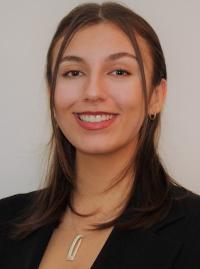
The 2021-2022 Francis Student Research Fellowship recipient is Breann Kniffen ('23) who is a Cell and Molecular Biology student. With more than 4,000 bee species living in North America, there are still many unknowns and little information regarding the distribution, abundance, and health of native bees. As the global decline in insect populations continues to decrease, so does the loss of pollinator insects such as native bees. The loss of these crucially important insect pollinators threatens global food security, erodes ecosystem resilience, and more. Breann’s native beekeeping and research project aims to gain better insight into the diversity and abundance of native bee species in WA state, increase native bee awareness to the public, and increase native bee abundance on SU campus by testing if bee housing structures increase native bee survival rates.
Read Breann's mid-term report, her Final report and watch her final presentation.
The 2020-2021 Francis Student Research Fellowship recipient is Myron Joel Bañez ('21) who is double majoring in Economics and Public Affairs with a specialization in Urban Planning. Myron will be mentored by Dr. Tanya Hayes, professor of environmental studies. Myron's research will explore the following:
"Ethnic enclaves are neighborhoods that were created out of redlining. For many immigrant communities, enclaves are multipurpose as they provide a space for political, social, and economic empowerment. However, these spaces are influenced and shaped by the diaspora narrative and needs of a community. The Filipino diaspora in particular paints a complex image of the development, recognition, and utilization of Filipinotown.
This study examines the role of the built environment to urban Filipino-American spaces and community development in Seattle. Research and literature has helped identify three key findings 1) the approaches to Filipino urban space utilization 2) the sociological approaches to the utilization of ethnic enclaves 3) the role of entrepreneurship and an ethnic economy.
Based on the findings, this study stresses the importance of understanding the Filipino diaspora narrative when assessing ethnic enclaves as it conveys why and how space is utilized, or lack thereof.
Ultimately, Filipinotowns, are both social and physical manifestations. When questioned on the legality of a Filipinotown due to the lack of real estate, it is vital for communities and cities to understand that social space is equally important to an enclave’s physical existence. The phrase “Seattle Filipinotown Exists” embodies both qualities and the significance of acknowledging history and the potential that the present built environment has for the future." Myron's faculty mentor will be Dr. Tanya Hayes, Professor at the Institute of Public Service and Director of the Environmental Studies program.
